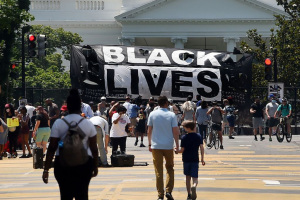Abortion and Murder's Eroding Distinction
Last week, two brutal stories brought to light the fine and tenuous line our culture maintains between legalized abortion and criminalized murder.
First, a teenage mother of a toddler was stopped in New York City, suspected of shoplifting. But when security officers looked in her bag, they found more than stolen merchandise. They discovered the corpse of a premature baby boy, born the day before, triggering a homicide investigation.
The next day, an emigrant from Samoa – who came to this county to become a Catholic nun – was charged in the District of Columbia with homicide. According to police, she told investigators she gave birth to a son and smothered him, afraid to let her superiors know about her sexual activity.
Two mothers who killed their sons now face murder charges. But either could have avoided incrimination by visiting a local abortion clinic for a "procedure" prior to birth.
Reports reveal that the baby boy found in the purse in New York was approaching the end of second trimester, roughly five to six months into the pregnancy. Abortions are legal in that state up to 24 weeks.
In District of Columbia, the Samoan woman could have had an abortion at any point in her pregnancy – up to the moment the baby was born.
Given the Supreme Court pronouncements on abortion, these two women violated the law only because they were tardy in terminating the lives of their respective babies.
One of the investigators involved in the New York case indicated that the mother was confused: "She said it was not full-term. She said she didn't know what to do with it." You have wonder if forgetting to schedule an abortion would be a viable defense for her in the criminal proceeding.
A couple of years ago, a similar argument worked in Canada. An Alberta judge let a woman who strangled her newborn and threw him over a fence go free because of Canada's stance on legalized abortion.
In the decades following Roe v. Wade, advancements in ultrasounds and other forms of medical technology have chipped away at the false distinction between a fetus in the womb and a baby outside it. Knowing what we now know about the development of the human being in utero, it makes little sense for the value of life – and the consequences for ending it – to be tied to location and timing.
Others, most notably, proponents of infanticide, have noticed this blurring of illegal killing and legal termination of life. Dr. Peter Singer, professor of Bioethics at Princeton, has long championed infanticide on the basis that "there is no sharp distinction between the fetus and the newborn baby." Last year, a pair of "ethicists" from Australia, Alberto Giubilini and Francesca Minerva, made the case for infanticide – or what they call "after-birth abortion" – in the Journal of Medical Ethics, urging that infanticide ought to be allowed as long as abortion is allowed. In this piece, the authors point out that Netherlands already permits the killing of disabled newborns under its Groningen Protocol.
No longer able to differentiate between abortion and murder, our culture is seemingly at a crossroads. We can either openly sanction baby killing or condemn it.
Having raised a generation of adults with abortion on demand, death has become an entrenched part of life. This should cause us as Christians to lament, but it should also prompt us to get busy.
Government-approved slaying of babies is not a recent phenomenon. Infanticide was practiced in cultures around the world throughout history. In some cultures infants were sacrificed to their gods. In ancient Greece and Rome, it was permissible for fathers to leave infants outside to die.
In each instance, Christians helped turn the tide towards life. The apostles taught early believers to value life, and Constantine, the first Christian emperor in Rome, made infanticide a crime.
Christian clergy were the ones who formed the first orphanages, caring for abandoned children and preserving their lives. Unwanted children in the middle ages were routinely left at churches because the clergy – as it was widely known – were pleased to take care of them.
If the church did it before, we can do it again.
Society needs to understand: the answer to this dilemma is not to legalize infanticide, but to outlaw abortion.



























